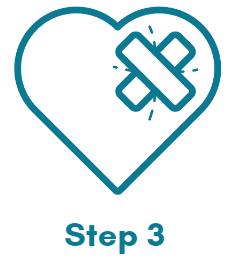What is Cognitive-Behavioral Conjoint Therapy?
Cognitive-Behavioral Conjoint Therapy (CBCT) is the only evidence-based couples/family therapy for treating Post-Traumatic Stress-Disorder (PTSD). It is effective when used with survivors of physical and sexual violence, accidents, criminal victimization, and military combat.
While PTSD is an individual response to a trauma, it has a detrimental effect on intimate and family relationships, and yet the quality of a survivor’s relationships will impact their recovery.
By involving a family member or romantic partner in CBCT, some survivors find it improves their relationships and moves them from isolation to connection.
What Can I Expect With CBCT?
Typically, CBCT spans 15-sessions and each session is 75 minutes long.
Each CBCT session is attended by the individual who is experiencing PTSD and a loved one (eg. parent, partner, friend, etc.). It is important that that loved one commit to attending all 15-sessions.
CBCT is a structured program and typically involves three phases:
Phase 1: Education
- You and your loved one learn about
- PTSD – what it involves and how it impacts relationships.
- Emotions – their role in recovery and how to experience them safely
- Various strategies for managing conflict are taught and practiced.
Phase 2: Increasing Satisfaction and Decreasing Avoidance
- Connections are made between thoughts, feelings, and behaviour.
- Clients work together to shrink the role of PTSD in their relationship by
- identifying and sharing their feelings,
- enhancing communication skills to increase emotional intimacy,
- and most importantly, moving out of avoidance of feared people, places situations and emotions.
Phase 3: Challenging PTSD Maintaining Thoughts
- Clients learn to challenge the thoughts that are maintaining PTSD symptoms. This includes thoughts about:
- why the traumatic event occurred,
- how it has impacted the individual and couple when it comes to safety, trust, power/control, esteem and intimacy.
- Time is spent preparing for future stressors and how the couple can navigate them using previously learned skills.
Homework is assigned after each session – this is an important component that reinforces what was learned. Research shows that the more clients practice between session, the greater the therapeutic outcomes. Practice does create improvement!
Is CBCT Right For Me?
CBCT is a time limited and evidence-based therapy that effectively treats PTSD. It is a great approach for clients who are worried about going through the therapy process and would find it helpful to have support while processing the trauma. It can also be helpful when there has been a significant impact on the relationship.
CBCT is not always the best fit for everyone. This is simply because not everyone wants to process the traumatic events that they endured with another person.
 If that sounds like you, there are other, evidence-based, and highly effective treatments for PTSD that do not require you to involve a loved one.
If that sounds like you, there are other, evidence-based, and highly effective treatments for PTSD that do not require you to involve a loved one.
At New Moon Psychotherapy we offer these evidence-based treatments for PTSD:
- Cognitive Processing Therapy (CPT)
- Prolonged Exposure
- Dialectical Behaviour Therapy for PTSD (DBT-PTSD)
Not sure if CBCT is the right fit for you? Don’t worry! We will ask you some questions when you first reach out to better understand your goals and situation and then connect you with a therapist who will be the right fit.
We’ll also give you a chance to meet with the therapist for a free 15-mintue consultation so that you can learn about their approach, ask any question that you might have, and determine if you’d like to work with them.






